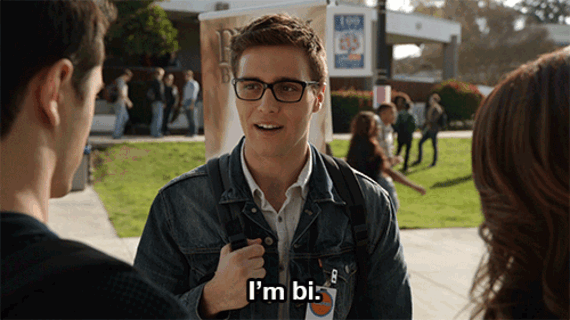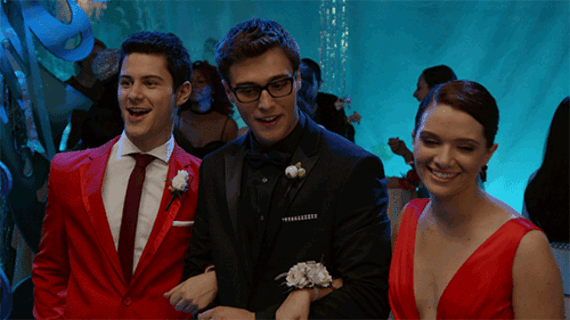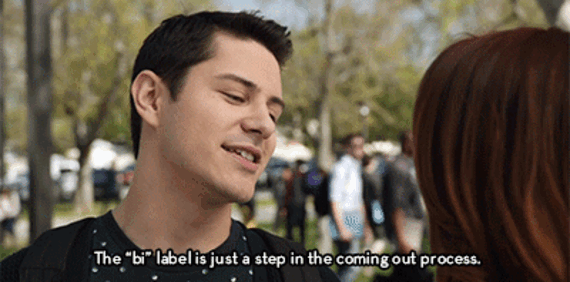[Spoilers Ahead]
The premise of MTV's show Faking It had the LGBT community worried -- myself included. The series premiered a storyline on best friends, Amy and Karma, "faking" being lesbians. Critics called the idea insensitive to the often harsh realities of coming out as a teenager.
However, the show is set in a faux liberal bubble in which the hot popular guy is a sculptor, Karma's parents have an organic juice truck and use the term "womyn," and the remaining high school students are usually involved in some sort of social justice protest. This context had me hoping that conversations on sexuality would be just that -- progressive. Unfortunately, the first season finished with Karma "coming out" as straight and Amy not being sure about her sexuality.
On its face, this storyline shouldn't be problematic. It seems the writers are giving Amy space to figure out her sexuality. In actuality, it paints bisexual youths as unsure of their sexuality. It's season two and we've seen Amy express feelings for both girls and guys without uttering the "B" word. She is left in the ambiguous I-don't-do-labels box that bisexual characters often get placed in à la Piper Chapman.
This isn't particularly new. Fictional characterizations of bisexual identities are hard to come by. And even those that do express attraction to more than one gender never utter the word bisexual. The rare times bisexual characters are found in media, they are usually women and riddled with inaccuracies or overtly offensive stereotypes.
When Faking It introduced a bisexual male character, Wade, a few episodes ago, I was excited for all of two seconds. There was a glimmer of hope when Karma, and resident gay character Shane, weren't sure of Wade's sexuality. When asked if he was gay or straight, Wade responds: "I'm bisexual. Did that not even occur to either of you?"
That glimmer of hope passed quickly. It took maybe half an episode to show this bisexual character is one big walking trope.
Yes, Wade is attracted to both Shane and Karma and he simply can't decide whom he wants to date. So, when the idea of a throuple date is presented, he jumps at the chance. Then later, when Shane suggests a threesome, in order to get Wade to cave and only have sex with one of them, Wade is all about it.
If Wade was presented as a poly bisexual interested in having a polyamorous relationship, it would be one thing. But the idea of Wade being poly eludes Faking It writers who instead paint him as a bisexual who just can't decide and is sexually greedy (Not that there's anything wrong with threesomes. Just that bisexuals being prone to threesomes is a tired bisexual trope.)
The tropes aside, really it's Faking It's biphobia that must be addressed.
In the most recent episode, Shane discussed Wade's bisexuality with his straight best friend, Liam.
"He only thinks he likes her. He's like a gay butterfly not yet sprung from its cocoon," Shane said. "He's stuck at 10% bi-curious caterpillar caught in transition."
"Right cause guys can't be bi," Liam retorted.
"Exactly. It's like Bigfoot. People talk about it but no one has any proof," Shane replied.
This example of biphobia could have been a great teaching moment for Faking It's audience. Yes, these types of examples of bisexual tropes and biphobia are things we bisexuals experience. The fact it came from Shane, the gay character, is even more relevant as bisexuals face this type of biphobia from those within the LGBT community as well.
(Full disclosure: I interviewed Michael J. Willet, actor who plays Shane, last year for The Advocate.)
This is even more disappointing as Faking It has one of the best portrayals of an intersex character in media. A main character, Lauren, had a great coming out story as an intersex individual. The showrunners elicited help from GLAAD and Inter/Acts to get the story right. Some ugly things were said in the show about intersex individuals but the show turned it into a teaching moment for the audience.
The writers of the show tweeted Shane's biphobic views don't reflect the views of the writers, saying that sometimes characters can have wrong opinions. Which is true--only if it's actually resolved. Unlike the nasty things said about intersex folks, the bisexual tropes and biphobia are never resolved.
Indeed, they were presented without full correction. While sometimes Shane's comments on bisexual people were challenged by his friends, Shane never has an "ah ha!" moment showing he is aware of his biphobia. This coupled with the ambiguously bisexual portrayal of Amy makes Faking It one big bisexual blunder.
These media portrayals don't happen in a vacuum. It's exactly this type of biphobia that leads bisexual youths to have greater challenges than their gay and lesbian peers. The Human Rights Campaign released "Supporting and Caring for Our Bisexual Youth" last year outlining the shocking disparities bisexual youths face.
"About a third of bisexual youth reported they have been harassed frequently or called names at school, and 56 percent said they didn't have a supportive adult in their family," the report notes. Bisexual youths face higher rates of bullying. Once they are brave enough to come out, the gay community often deems their sexual orientation as invalid. So I guess it should be no surprise that MTV's Faking It unapologetically reinforces biphobia.
Both Amy and Wade are examples of poorly written bisexual characters. Amy falls into the ambiguously bisexual character trope, and Wade is the "sexually greedy" "unable to decide" one. These characterizations are not only lazy but also impact the perceptions of bisexuals in real life.
Faking It could have risen above the fray and consulted GLAAD or BiNET USA on the proper depiction of a bi character as they did with the intersex character of Lauren. Instead, the lazy way they chose to include bisexual storylines reinforced the stigmas we face.


